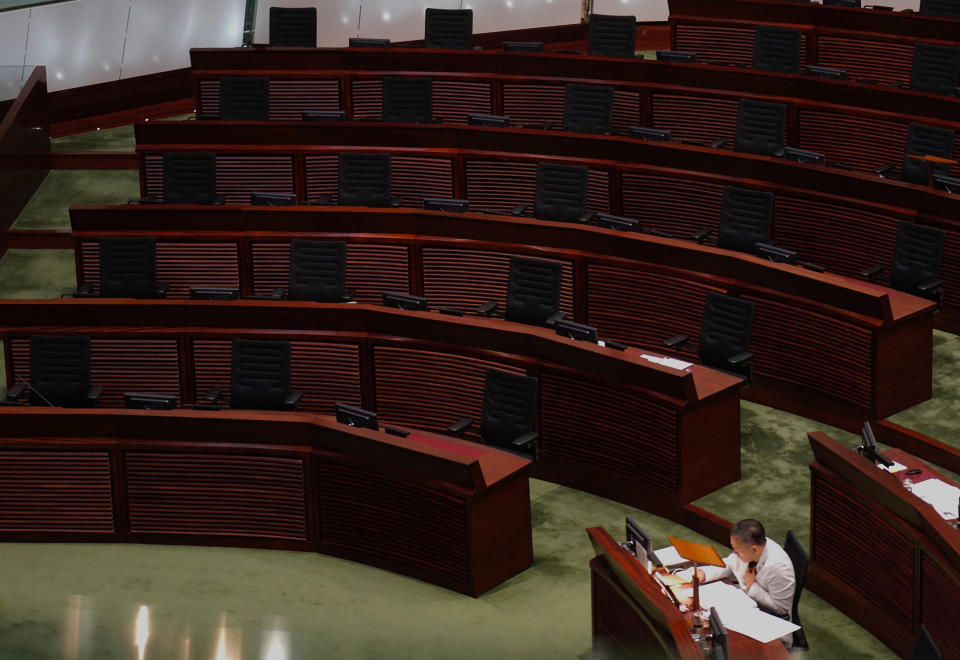U.S. threatens Beijing with new sanctions over Hong Kong lawmaker suspensions
Hong Kong's remaining pro-democracy opposition lawmakers resigned en masse Thursday in solidarity with four lawmakers who were disqualified earlier this week, leaving mostly pro-Beijing members in office.
China could face new U.S. sanctions over the disqualifications, which "leave no doubt" that the Chinese Communist Party has "flagrantly violated its international commitments," national security adviser Robert O'Brien said Wednesday.
He added the U.S. would "utilize all powers" including sanctions on "those responsible for extinguishing Hong Kong's freedom." The Hong Kong government said it would strongly oppose any new measures.
Britain, which has historic colonial ties to Hong Kong, said on Thursday the disqualifications put Beijing in breach of international law.
Beijing has this year clamped down on Hong Kong's burgeoning pro-democracy movement with a punitive national security law that purports to outlaw acts of secession, subversion, terrorism and collusion with foreign forces.
Activists and international observers say the law breaches the longstanding freedoms afforded to the city by "One Country, Two Systems" — the constitutional principle that affords Hong Kong various democratic freedoms not permitted on mainland China.
In a final show of defiance against Beijing, the remaining 15 lawmakers of the Democratic Party quit Hong Kong's 70-seat Legislative Council, known as Legco, saying they had no regrets over the move.
Unfurling a white banner vilifying Carrie Lam, the city's leader, opposition lawmaker Lam Cheuk-ting was among those who stepped down on Thursday.
"Today, some may feel discouraged and sad ... but we must believe that the night is long and the light will always come," he said on Facebook.
"We're quitting the legislature at this juncture, but we're NOT quitting the Hong Kong democracy fight," said another opposition politician Claudia Mo on Twitter, after she and fellow lawmakers locked hands in a press conference announcing their resignation.
Hong Kong's Beijing-backed government disqualified four opposition members from the legislature on Wednesday for endangering national security, after China's legislature gave city authorities new powers to curb dissent.
The resignations mean an end to what has been one of the few forums of dissent, after Beijing introduced the security law in June.
"The democratic process has been sabotaged by the political will of the party-state," Eliza Lee, professor of politics at the University of Hong Kong told NBC News.
"All elected lawmakers are now subjected to the discipline of the red line drawn by Beijing," she said, adding that "external pressure" was likely now the only constraint.
Download the NBC News app for breaking news and politics
The U.K., which controlled Hong Kong until 1997, said Thursday China was in "clear breach" of the Sino-British Joint Declaration, which guarantees Hong Kong's autonomy under the "one country, two systems" formula, signed in 1984.
"China has once again broken its promises and undermined Hong Kong's high degree of autonomy. The U.K. will stand up for the people of Hong Kong, and call out violations of their rights and freedoms," Foreign Minister Dominic Raab said.
On Wednesday, Hong Kong's Chief Executive Carrie Lam defended the expulsion of the four opposition members as being in accordance with the law and dismissed suggestions the legislature without opposition members would become a "rubber stamp."
"We, especially myself, welcome diverse opinion in the Legislative Council. I respect the check and balance responsibility of the Legislative Council," Lam told reporters.
"If some members of the Legislative Council are not there to discharge their constitutional duties, then many people will have a lot to say about their behavior."

China denies curbing rights and freedoms in the global financial hub but authorities in Hong Kong and Beijing have moved decisively to stifle dissent after anti-government protests flared last year.
"We would like to warn these opposition members that if they want to use this to encourage radical resistance and beg for intervention from outside forces to drag Hong Kong into chaos again, that is a wrong calculation," China's Hong Kong and Macau Affairs Office said in a statement Wednesday.
China's Foreign Ministry spokesman, Wang Wenbin, told reporters during a briefing on Wednesday that the matter was an internal affair and "a justified and legitimate decision that conforms to the constitution and other laws."
The disqualifications and opposition walk-out are likely to add to concern in the West about Hong Kong's autonomy as Joe Biden prepares to take over from Donald Trump as U.S. president, promising to promote democracy around the world.
Reuters contributed to this report.

